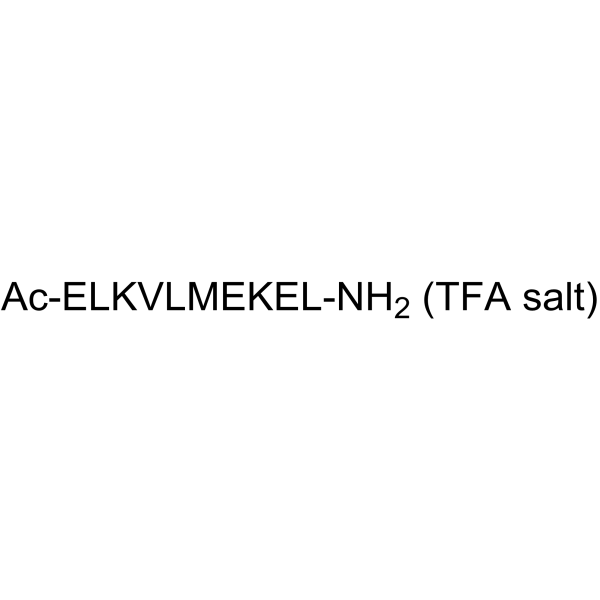RAGE antagonist peptide TFA |
| Catalog No.GC62702 |
RAGE antagonist peptide TFA is an advanced glycation end products (RAGE) antagonist.
Products are for research use only. Not for human use. We do not sell to patients.

Sample solution is provided at 25 µL, 10mM.
RAGE antagonist peptide TFA is an advanced glycation end products (RAGE) antagonist. RAGE antagonist peptide TFA prevents RAGE from binding with several of its most important ligands, including HMGB-1, S100P, and S100A4. RAGE antagonist peptide TFA possesses anti-tumor and anti-inflammatory activities[1][2].
RAGE antagonist peptide TFA (RAP) reduces the ability of the ligands to stimulate RAGE activation of NFκB in cancer cells in vitro[1].
RAGE antagonist peptide TFA (RAP, 100 µg) inhibits RAGE-mediated Basal NFκB Activity in PDAC cells in vivo[1].RAGE antagonist peptide TFA (RAP) reduces the growth and metastasis of pancreatic tumors and also inhibited glioma tumor growth[1].In mice bearing asthma, RAGE antagonist peptide TFA (RAP; 4 mg/kg; i.p.) blunts airway reactivity, airway inflammation and goblet cell metaplasia, and decreases release of Th2 cytokines. RAGE antagonist peptide TFA also reduces total, cytoplasmic and nuclear levels of β-catenin, enhances β-catenin phosphorylation at Ser33/37/Thr41, which triggers ubiquitination, down-regulated expression of β-catenin targeted genes, and tends to keep β-catenin at the cytomembrane, shifting β-catenin from a signalling active pattern to an adhesive function[2].
[1]. Thiruvengadam Arumugam, et al. S100P-derived RAGE antagonistic peptide reduces tumor growth and metastasis. Clin Cancer Res. 2012 Aug 15;18(16):4356-64.
[2]. Lihong Yao, et al. The receptor for advanced glycation end products is required for β-catenin stabilization in a chemical-induced asthma model. Br J Pharmacol. 2016 Sep;173(17):2600-13.
Average Rating: 5 (Based on Reviews and 24 reference(s) in Google Scholar.)
GLPBIO products are for RESEARCH USE ONLY. Please make sure your review or question is research based.
Required fields are marked with *




















